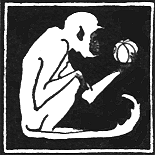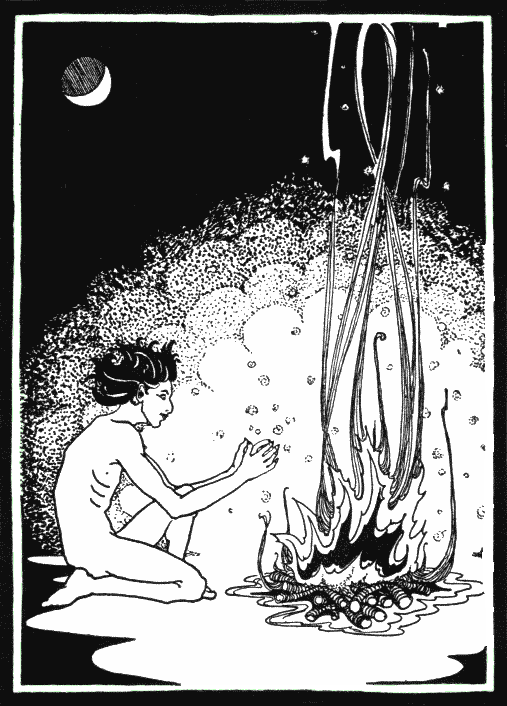 |  |
Wild at Heart Homepage | Contents | Previous Chapter
CHAPTER IV
A FIRE AND A FACE
1

Caution, the lesson of sixteen years, was forgotten. Splashing through the stream, plunging through thick scrub that would have torn an ordinary skin to ribbons, Nanga caused every head to go up and every ear to cock within a mile of him. An elephant would have made far less noise. But he did not know or care: he had lost his head.
For the nonce he was but a madman scudding through the dark. One moment, thorny branches were whipping his cheeks and chest; the next, he was on the wide shingly shore of the river, leaping from stone to stone; the next, chin deep in water, cool and familiar. But all the water in the world could not cool his head.
He made for the belt of sheeshum wood on the other side, where there was no undergrowth; and there, wet and shining, ran lightly on spongy grass, driving before him a couple of startled nilgai--fat blue bulls with stiff tails, making thunder with their hoofs. The moon was rising, silvering the frail trunks of the sheeshum into the semblance of birches in winter, and throwing a delicate lattice of shadows across the pale ground. The chill breeze from the north, that even in March carries in it a belated kiss from the eternal snows, swept across the ravine and made the lattice all tremulous. But Nanga noticed neither moon nor wind. Nothing could charm or cool that hot head of his, with its cargo of senseless sounds.
Chatter, chatter--
It was as if the grey company ran with him and gibbered at him through all those moonlit spaces, not to be shaken off.
Wildly, blindly he sped, like one haunted; never knew that he was on rising ground, passing from sheeshum to the denser sal; never saw how the sky at length brightened ahead and showed an end of woodland altogether; and would have blundered into the very walls of Kotahbagh village and have been shot incontinently for a dakoit, had he not fallen into a ditch instead.
2
It was a deep ditch which one Piri Ram had dug on the jungle side of his field in the hope that the deer would break their legs in it when they came to nibble his wheat, and so provide free venison for his house. Thoughtfully, that deer whose legs remained intact might nevertheless know a measure of discomfort, he had lined it with cactus and four-inch thorns from a cane-brake. So Nanga--who fell like a monkey, curled up in a ball--presented, as it were, a round pincushion to a most formidable array of pins. And, in the long process of extracting them, he cooled somewhat.
There were more thorns in him than he had fingers to pluck them out with, and most of them were in invisible places; so, by the time he had finished the painful task, the moon had topped the trees behind him, and Kotahbagh, separated by the width of one tiny field, lay clear as day.
The houses, clustered in two straggling lines beside the single cart-track that represented the main street, ranged in importance from the grey, mud-walled shelters of the very poor to the two-storied mansion of the head-man, washed in pink; the school, chaste in government whitewash; and the comfortable, square home of the patwari, painted pale blue. Pale blue was the Hindu temple; and a tiny mosque glimmered like a shining egg among black trees. grey and blue and pink, in that bewitching light the village was set in its surrounding fields like an opal, and Piri Ram’s cooking-fire in the foreground supplied the opal’s red fires. By daylight flaws would have been apparent: cracks in walls and scars in plaster; sagging roofs; unsightly heaps of dung-cakes; and dust sprinkled liberally over all. But moonlight is merciful, and there was a real beauty in the somnolent village, which lay, so quiet and unwatchful, within one field’s width of black jungle.
Smoke curled up from a dozen fires, thickening the powder-blue tint of the sky, filling the air with a fragrance of clean, burnt wood. Somewhere a man sang monotonously an unending song, as if talking to himself; a flute quavered and chirruped; and women chattered incessantly. It was a homely scene that might have touched a chord in any wanderer.
But it had no message for Nanga. There was no yearning in him--only a curiosity that any ape might have shared. Here was something new; new and quiet. He could watch this scene with out being watched. Even, he could steal a little nearer, by degrees, and see what men did.
He hopped out into the field and squatted, poised on the balls of his feet, fingers lightly touching the ground. That red fire chiefly intrigued him. He had never seen fire so near before, nor known how the face of it could change like something alive; like, strangely like, those treasures of his that he had buried lest they should fly away--the jewels and the butterflies’ wings. But this new brightness was bigger, more vividly alive. There were moments when it seemed to approach, moments again when it would recede almost to the disappearing point. Then it was that he could not help hopping nearer.
Nearer and nearer he stole, mesmerized. The closer he got to the fire, the less he could see of the houses behind it; and soon, dominated by that red eye, he forgot them altogether. He desired the fire; and, though the fire was within two paces of a man’s door, he would have it.
Now he could almost touch it. The wood had caught well and was burning at its zenith. Bright flowers of flame flickered out toward him, as if to entice him to play, and the warm breath of them fanned his cheek with a kiss more gentle than any kiss of the sun. But he could not pluck those flowers. They went so quickly back into the red heart from which they came.

But he could not pluck those flowers
He would have made a pleasing picture for Piri Ram to see, had that worthy been squatting, as was his wont, in his doorway and waiting for his supper to come on the boil. For his hair was blowing all ways; his shining skin was ruddy with firelight; and his eyes were agleam, as, like a dog making passes at a morsel withheld, he clutched at those fugitive playthings.
But Piri Ram was elsewhere. An hour ago he had waddled down the street to pay his five rupees to a fakir who smuggled charas from the hills, and at this moment was lying prostrate under the influence of a pipeful of the said drug, while the fakir was sitting over him and with a practised hand exploring the folds of his dhotee for a further instalment of rupees.
Yet--this was hidden from Nanga by the blaze--the door of Piri Ram’s house was open, and there was someone inside. Presently--this too was hidden--that someone gathered up a burden from the floor; came quietly out; and stood on the other side of the fire, which flamed like a curtain between the two of them.
It was a slight figure, draped in dark, flowing material, and at every movement metal clinked faintly, musically. The burden was a bundle of rubbish and dry sticks. It was poised a moment by slender brown arms. Then it fell where the glow was brightest.
Nanga started, stared. All his playthings had fled, just as he was about to plunge his hand into the very midst of them. Their place had been taken by heavy fumes that made him blink and brought tears to his eyes.
He coughed resonantly, unable to help himself. Then, as the fumes eddied away and little blue tongues of flame began to flicker again in the smothered fire, he saw something that for one instant deprived him of all power of movement. He crouched, open-mouthed, staring at a face that seemed to have grown mysteriously out of the night as a reflection grows out of water; a face that was something like his own, so seen in water; and, like his own, open-mouthed, full of wonder.
Then the fire flamed up again and hid the face.
He took to his heels instantly, while Parmala, only daughter of Piri Ram, was startling a peaceful village into hysterical activity with cries of “Daku! Daku! The thieves! the thieves!”
Nanga, hearing the hue and cry, pounded the harder.